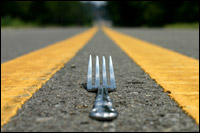Dear Umbra,
But the question was paper or plastic. We are asked every time we go shopping. What if we’re doing all those things you suggested, and we still want to know if we should use paper or plastic? I think your answer was haughty and irresponsible.
Curt
Newton, N.J.
Dearest Curt,
So many annoyed readers wrote to chide me on avoiding the paper-or-plastic question. Sorry. I try to entice us all toward bigger themes, with mixed success. Here is an old exploration of the bag issue. The correct answer to the grocery bagger’s question is, “Neither, thank you, I brought my own.”

Fork in the road? Take it.
So what about the other choices we face every day? Remember, even though we are obsessed with them, they are not as important as we want to believe. Many of them make no difference, except in giving us another point on which to obsess, and we should be conserving our energy for more important — are you still reading? OK, I will review the perfect tiny-choice day, as I currently understand it from my years of writing this column. You know I spend all day in the basement, so I’ll have to scrape the brain barrel for this one, and I might not cover it all.
We wake up in organic and/or hemp sheets, take a shower not a bath, shave with a metal razor, put on air-dried clothes, and have fair-trade coffee. Greet the rest of our efficient household, with whom we share energy-efficient appliances. Pack our old metal lunch box or tiffin. Bike or bus to work. (If we drive, carpool, and at a steady, sensible speed in an efficient — perhaps even alternative-fuel — car. Also, open the windows instead of using the AC, and never idle.)
At work, we use a solid mug for coffee, buy recycled paper and reuse as much as possible, plus print as little as possible. We see that our computer goes to sleep quickly and is turned off, along with all other appliances and the lights, when we leave for the day. Maybe we don’t work in an office: drivers, plot an efficient route; chefs, try to buy organic and compost scraps; teachers, encourage appreciation of nature in your students.
Then go home, stopping for any necessary errands on the way. No errands that involve purchasing useless, disposable plastic tchotchkes. We fill our cloth shopping bags with fresh, local, vegetarian, unprocessed foods and products with recycled content; no farmed fish, hair dye, nail polish, leg wax, flushable toilet-bowl brushes, diapers, scented candles, tropical fish, or new diamond rings. We cook dinner in the microwave or toaster oven, then put the unrinsed dishes in the efficient dishwasher and food waste in the compost, never using a garbage disposal.
We spend the evening with our family or friends doing a variety of low-impact activities. The following are out: snowmobiling, leaf-blowing, jet-skiing, pesticiding the lawn, tumble-drying clothes, cleaning the tub with toxic chemicals, turning the thermostat to 75 degrees. These others are recommended: walk to nearby entertainment, gather with neighbors and plan to destroy local invasive plants, turn compost, knit, pogo-stick, build a Christmas tree, read The Lorax out loud, watch Hayao Miyazaki movies, turn up the radio and dance all night.
Respectfully,
Umbra
P.S.: Stay tuned for a page of your FAQs, which we’ll be unveiling later this week.


